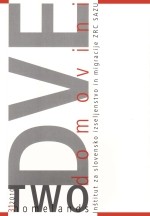Balkanology: A Theoretical Contribution to the Understanding of the Role of Culinary Otherness in European Culture, or Why are the Balkans so hated even though they have such great food?
Keywords:
food, culinary, culture, enjoyment, national identity, ideology, the Balkans, EU, SloveniaAbstract
The paper presents, firstly, how the ideological mechanism of inward reproductive spatial distribution works in the European space, whose structural consequences are always two opposite cases of identification: “we Europeans” and “we Other Europeans”; and secondly, to illustrate this distribution through the paradoxical case of the acceptance of the Others’ food culture and the rejection of their “national Otherness”.
Downloads
References
Agamben, Giorgio (1998). Homo Sacer. Sovereign Power and Bare Life. Stanford: Stanford University Press.
Althusser, Luis (2000). Izbrani spisi. Ljubljana: *cf.
Austin, J. L. (1962). How To Things With the Words. London: Oxford University Press.
Bjelić, Dušan I. (2002). Introduction. Blowing Up the “Bridge”. Balkan As a Metaphor. Between Globalization and Fragmentation (ur. Dušan I. Bjelić in Obrad Savić). Cambridge, Massachusetts in London: The MIT Press, 1–22.
Boyar, Ebru (2007). Ottomans, Turks and the Balkans. Empire Lost, Relations Altered. New York: Tauris Academic Studies.
Braudel, Fernand (1967/1992). Materijalna civilizacija, ekonomija i kapitalizam od XV. do XVIII. stoljeća. 1. Strukture svakidašnjice. Zagreb: August Cesarec.
Brown, Wendy (2006). Regulating Aversion. Tolerance in the Age of Indentity and Empire. New Jersey: Princeton University Press.
Evropska stranka zelenih (2008). Green Food Policy for Europe Strengthening European food culture, http://europeangreens.eu/fileadmin/logos/pdf/policy_documents/ green_food_policy/adopted_food_policy.pdf (6. 4. 2010).
Dedić, Jasminka, Vlasta Jalušič in Jelka Zorn (2003). Izbrisani. Organizirana nedolžnost in politike izključevanja. Ljubljana: Mirovni inštitut, Inštitut za sodobne družbene in politične študije.
Ellias, Norbert (1969). The Civilizing Process, Vol. I. The History of Manners. Oxford: Blackwell.
Fischler, Claude (1997). A Question of Balance. Nutrition, Health and Gastronomy. Appetite 28(3): 267–277.
Fischler, Claude (2005). Meso, podela i socijalni napredak (Kultura svaštojeda). Kultura 109/112: 247–276.
Freud, Sigmund (2004). Tootem and Taboo. New York in London: Routledge.
Geertz, Clifford (1973). The Interpretation of Cultures. New York: Basic Books.
Gellner, Ernest (1983). Nations and Nationalism. New Perspectives on the Past. New York: Cornell University Press.
Hirschfelder, Gunter (2001). Europäische Essekultur. Frankfurth am Main: Campus Verlag.
Hobsbawn, Eric (2000). Introduction: Inventing Traditions. The Invention of Tradition (ur. Eric Hobsbawn in Terenece Ranger). Cambridge: Cambridge University Press, 1–14.
Goff, Jacques le (2005). The Birth of Europe. Oxford: Blackwell.
Kuhar, Boris (1999). Sto značilnih jedi slovenskih pokrajin. Ljubljana: Prešernova družba.
Janović, Nikola in Rastko Močnik (2006). Three Nexal Registers: Identity, Peripheral Cultural Industries and Alternative Cultures. Transcultural Europe (ur. Hanna Meinhof, Ulrike Hanna in Ana Triandafyllidou). Basingstoke in New York: Palgrave Macmillan, 223–253.
Janović, Nikola (2009). Biopolitika, Životinje. Meso. Hrana. Filozofija i društvo XX(2): 41–58.
Kymilicka, Will (2007). Multicultural Odysseys. Navigating the New International Politics of Diversity. New York: Oxford University Press.
Lacan, Jacques (1985). Seminar, Knjiga XX: Še. Ljubljana: Problemi/Društvo za teoretsko psihoanalizo.
Lacan, Jacques (2008). Hrbtna stran psihoanalize. Ljubljana: Analecta/Društvo za teoretsko psihoanalizo.
Lévi-Strauss, Claude (1996). Uvod v delo Marcela Maussa. Esej o daru in drugi spisi (Marcel Mauss). Ljubljana: ŠKUC in ZIFF, 227–266.
Levi-Stros, Klod (1978). Divlja misao. Beograd: Nolit.
Marx, Karl (1961). Kapital. Ljubljana: CZ.
Miller, Jacques-Alain (2001). O nekem drugem Lacanu. Ljubljana: Analecta.
Mlekuž, Jernej (2008). Burek.si?! Ljubljana: SH.
Močnik, Rastko (1999). 3 teorije. Ljubljana: *cf.
Močnik, Rastko (2003). Teorija za politiko. Ljubljana: *cf.
Montanari, Massimo (1993/1998). Lakota in izobilje. Zgodovina prehranjevanja v Evropi. Ljubljana: *cf.
Montanari, Massimo (2006). Food is Culture. New York: Columbia University Press.
Nancy, Jean-Luc (2007). The Creation of World or Globalization. New York: State University of New York Press.
Onfre, Mišel (2002). Gurmanski um. Filozofija ukusa. Čačak: Gradac.
Parsons, Talcott (2005). The Social System. London: Routledge.
Poulain, Jean-Pièrre (2005). Mondalizacija, izmeštanje i premeštanje hrane (Kultura svaštojeda II). Kultura 109/112: II–129.
Radcliffe-Brown, A. R. (1994). Struktura in funkcija v primitivni družbi. Ljubljana: Škuc in Filozofska fakulteta.
Said, Edward (1977). Orientalism. London: Penguin.
Taylor, Charles (1991). The Ethics of Authenticity. Cambridge, Massachusetts in London: Harvard University Press.
Taylor, Charles (1994). The Politics of Recognition. Multiculturalism. Examining the Politics of Recognition (ur. Amy Gutmann). New Jersey: Princeton University Press.
Todorova, Maria (2009). Imaging the Balkans. New York: Oxford University Press.
Viales, Noëllie (1987). Le sang et la chair. Les abattoirs du pays de l'Adour. Paris: MSH Ethnologie de la France.
Wallerstein, Immanuel (2006). European Universalism. The Rethoric of Power. New York in London: The New Press.
Walters, Kerry S. in Lisa Portmess (2001). Religious vegetarianism. Albany: State University of New York Press.
Weichselbaum, Elisabeth, Bridget Benelam in Helena Soares (2009). Traditional Foods in Europe. Synthesis Report No 6, EuroFIR Project Management Office/British Nutrition Foundation, http://www.eurofir.org/sites/default/files/EuroFIR%20synthesis%20reports/Synthesis%20 Report%206_Traditional%20Foods%20in%20Europe.pdf (5. 5. 2010).
Wilson, Thomas M. (2006). Food, Drink and Identity in Europe: Consumption and Construction of Local, National and Cosmopolitan Culture in Food, Drink and Identity in Europe. Amsterdam in New York: European Studies. An Interdisciplinary Series in European Culture, History and Politics.
Downloads
Published
How to Cite
Issue
Section
License

This work is licensed under a Creative Commons Attribution-NonCommercial-NoDerivatives 4.0 International License.
Authors guarantee that the work is their own original creation and does not infringe any statutory or common-law copyright or any proprietary right of any third party. In case of claims by third parties, authors commit their self to defend the interests of the publisher, and shall cover any potential costs.
More in: Submission chapter





